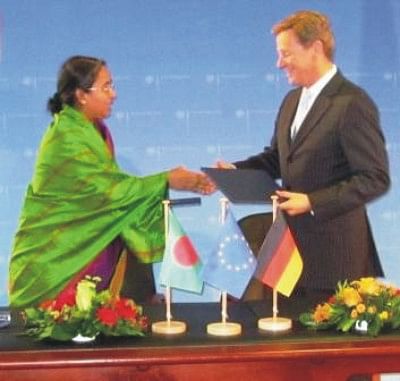Revisiting an old friend

Consolidating the goodwill. Photo: ministry of foreign affairs-Bangladesh
The centre of the talks between German Foreign Minister Guido Westerwelle and Dr. Dipu Moni was bilateral cooperaton between Germany and Bangladesh in business, international negotiations on climate change and cultural relations.
This was the first visit of Foreign Minister Dr. Dipu Moni to Germany. In their meeting on September 1, German Foreign Minister Dr. Westerwelle praised the role of Bangladesh in the international climate change conferences. Both countries will work together to make the December climate conference of the UN, in the Mexican city of Cancun, a success.
After their long conversation both ministers signed a declaration of intent to deepen the cultural relationship between the two countries. There will be exchange of artists, and organisation of exhibitions, plays and concerts. There will also be more schools in Bangladesh taking part in the global network of PASCH.
The partner school initiative PASCH is a global network of schools where the pupils are inspired to get an interest in German language and culture. Inclusion of more schools from Bangladesh means that there will be more chances for Bangladesh pupils to later study in Germany.
Germany and Bangladesh will also cooperate more closely in the economic field. In presence of both the foreign ministers, representatives of German and Bangladeshi companies signed an agreement for setting up joint ventures. Both partners plan to build container ships and run a shipping line for the transport of containers within Bangladesh, mainly between the harbours of Dhaka, Chittagong and Mongla. With this project there will also be technology transfer to Bangladesh.
Political relations between Germany and Bangladesh are very friendly. In 1972, Germany was one of the first European countries to officially recognise the independence of Bangladesh. In 1990, German reunification was warmly welcomed by Bangladesh.
Economic relations are constantly growing. Germany is Bangladesh's second most important export market after the US. The volume of bilateral trade in 2009 went up to more than €2 billion inspite of the global economic crisis. Bangladesh exports goods worth €1.9 billion to Germany, while Germany's exports to Bangladesh amount only to €290 million.
Dr. Dipu Moni also met the German minister for economic cooperation and Development. The cooperation between Germany and Bangladesh is very strong. Since 1972, Bangladesh has received €2.4 billion from Germany. Both ministers agreed to step up the programmes of development aid, specially in the fields of health, energy efficiency and protection against the effects of climate change.
In her very busy programme in Germany, Dr. Dipu Moni gave speeches at the famous Humboldt University in Berlin and at the Konrad Adenauer Foundation, named after the first chancellor of the new Germany after the Second World War. There, she compared the start of the new Germany and Konrad Adenauer's role with the independence of Bangladesh and the role of Sheikh Mujibur Rahman.
The minister aroused a lot of interest and sympathy in the audience when she compared the size of Germany and Bangladesh, saying that there would be more than 400 million Germans if Germany were as highly populated as Bangladesh. She also pointed out that Bangladesh is a force for peace and cooperation in the region.
Other subjects talked about in these meetings were energy, specially coal mining, climate change and issues like Digital Bangladesh and the situation in the prisons of Bangladesh. In the Konrad Adenauer Foundation meeting, the former ambassador to Bangladesh Dietrich Andreas and present Ambassador Holger Michael were present. The chairman of a ship building company of Bangladesh, Neo G. Mendes, and his German counterpart also took part. The meeting was highlighted by the presence of the former defence minister Volker Ruhe. Representatives of the Bengali community in Germany were also present.
The visit of minister Dr. Dipu Moni was very successful, and she also gained a lot of sympathy and understanding for Bangladesh in her public appearances.
The foreign minister's visit to Germany started on August 28. She was invited to an iftar party organised by the Bengali community in Frankfurt, which Bengalees from all over Germany attended. In Bonn, she had a full day's meeting with the Humboldt Foundation. She met Humboldt scholars from all over the world, who cooperate with German institutions on climate change and other global issues.
Her speech on climate change was welcomed warmly by the Humboldt community. In Bonn, she also met with the Mayor of Bonn and had a meeting with the Director General of Deutsche Welle. She visited the Bengali service of Deutsche Welle, which started in 1975 at the initiative of the late chancellor Willy Brandt. The minister left for Bangladesh September 3 after a successful and eventful visit.

 For all latest news, follow The Daily Star's Google News channel.
For all latest news, follow The Daily Star's Google News channel. 



Comments